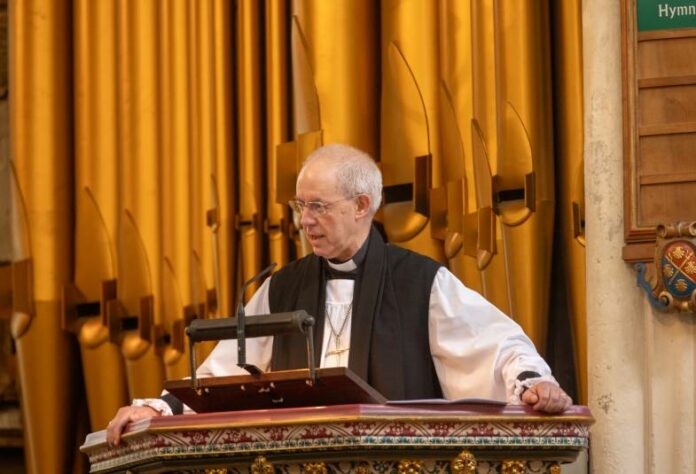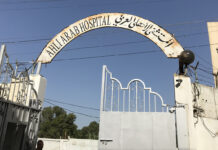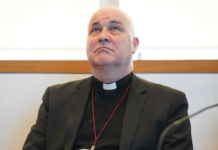Thank you for the invitation to speak at this service from the Abbey. For many years it has been held at the start of the new Parliament and on every occasion, there is something special about it, because it is the moment where we recognize the ability of this country to hold those in power to account, whether it should continue or to change.
In the last couple of weeks, [the peaceful transfer of power] has been a great witness to the world of good things in this country. I’ve had emails and WhatsApp’s from around the globe commenting on the speed, smoothness and grace of the process of changing the government. Fourteen hours from the exit poll to the appointment of a new Prime Minister.
Though that may be quite overwhelming for some of the people who’ve found themselves in a different place. That smoothness and grace, [captured by] the former Prime Minister in his words as he left, may seem scant consolation to those who lost seats or lost office. Yet, it is something that we are rightly proud of. However disappointed, none looked to change the result. However pleased, none I trust, are seeking personal revenge for years in opposition. That reality sounds so trite because it is so normal; would that it were so, right across the world. May God be praised for the quality of our politicians in that regard.
One of the great theologians of the 20th century, Karl Barth, who wrote during the 30s and the 40s, and stood up strongly against the Nazi’s, said, ‘freedom is God’s greatest gift’. He went on to say that the Christian politician is defined by conducting themselves free from fear.
Those who stood in the last election, whatever the result, are people of courage. For we face a time of danger without, and anger within our nation. Many of you will have endured abuse beyond the acceptable and normal in a campaign. Threats aimed especially at women are becoming normalised. Hustings held in churches have sometimes needed close protection officers. The gracious transfer of power that we celebrate is fragile.
And the readings today touch on that fragility, because they speak deeply both to the temptations of being in government or opposition. They speak both of human action and of God’s deep faithfulness, and why we should have joy and hope.
When God calls us, human importance and power have no weight. In many of the momentous events around Jesus, women play the central part. Mary is the greatest example, the mother of our Lord. Perhaps wearied by the tittle tattle and gaslighting surrounding her pregnancy, she goes up to the hills to see her cousin Elizabeth. Neither of these women are important by the standards of the time and when the Holy Spirit inspires Mary in the beautiful words of the Magnificat, she tells us of a God for the poor, for the weak, for the oppressed.
God has chosen her, unknown, far from the centres of power, for her simple faith lived in courageous obedience, and this song above all songs reveals to us God’s inner nature.
Mary sings with joy because she sees who God is, seeing God’s nature, she has hope. God has chosen her and through the words of Jesus, that choosing a one woman will become a call to every human being to allow God to choose them. It is not a choice based on importance or skill. For this is a call to be sent and to bring the news of salvation to help us.
The structure of the song in its key verses is wonderful, two pairs of contrast: the powerful thrown down, the lowly raised up, the hungry fed, the rich going away empty.
It is a song that shows the ultimate authority in the universe. God himself sees all as equal, calls all equally, and cannot be shaken from that nature of love that commands a society of hope for every person, because it is holy in its structures. It is – and this is about God who is not “woke” but is holy – it is a revelation of God’s purpose for those who lead human society, not for one group or another to benefit, but for all to find the joy that Mary has, joy derived from hope in the God who commands all things.
Both readings are shocking, revolutionary, and world changing if we allow them to be. Yet they are also reasonable and pragmatic. The prophet Micah was writing to a nation on the verge of collapse, facing enemies abroad and deep divisions at home. The leaders of the people to whom he prophesied when they heard him, may well have asked themselves the question ‘but what we actually do?’ Politics is about decisions of immeasurable difficulty. I’m sure you’ve noted.
It means holding enough bandwidth in the head to deal with more issues than can be imagined by those of us not personally engaged. It demands the allocation of limited resources to limitless need. And the Bible teaches that we cannot deal with all the problems of the world. What we can do is to be done according to the simplest of formulae; “do justice, love kindness, walk humbly with your God”.
And here the passages link. For God, with whom we walk, does love justice, does do mercy, and walked humbly with us in Galilee. He died on a cross and rose from the tomb, and ascended, and sends His Holy Spirit to enable us to see more clearly, to discern what is right. Because God loves justice, we are to be just. Because God is merciful, we know that we do not serve an unbending tyrant, but can trust God to receive us with all our failures and successes in arms of infinite love and mercy. The fears and traits that this nation will encounter in the next five years during the possible term of this Parliament may become huge, very great indeed. The responsibility you take, on our behalf, aided and supported so wonderfully by the Parliamentary staff and officers, is enormous. The credit and honour you receive is small in the eyes of cynics, but you are seen by God.
So, we have hope, in the biblical sense of a sure anticipation of God. Do not be afraid, for God has regarded our lowliness, and loves us. Be filled with joy as you begin each day in prayer, as you see afresh the love that he has for you personally and for this nation. For that love does not depend on success, or position, but on his faithfulness. It is not time limited but eternal.
Thank you for what you are permitted to do and may you know that our faithful saviour Jesus Christ guides and keeps you and those who you love. May he protect and preserve you, and may you find in his infinite kindness your capacity to do right, to love justice, and to walk humbly with Him. Amen.



